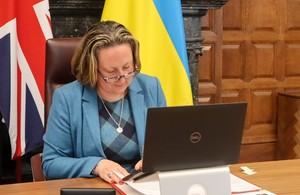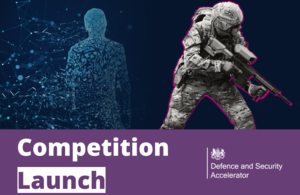Thank you (Tania) for that kind introduction and thank you all for welcoming me to close your conference.
As a Chancery barrister, I am particularly delighted that my very first speaking engagement as Chair of the Commission is with a large body of trustees. You are the legal core of any charity, and as such you rank particularly highly in my own legal estimation.
What I am going to do, as briefly as I can, is speak a bit about myself and my journey here, a bit about my priorities for the Commission, and a bit about the Commission’s future relationship with you as trustees.
Some of you will know that I have been a Chancery barrister for the past 28 years, and a Queen’s Counsel since 2014. I have already had a nearly 5-year stint as a Board member at the Commission under William Shawcross. And I have nearly 30 years of volunteering under my belt, beginning with running aid to Bosnian Muslims in the Yugoslavian Civil War in 1992, and following that with being:
- on the Management Committee of Westside Housing
- a Governor of Ilfracombe CC
- a fellow of the Centre of Social Justice
- on the Advisory Board of NCVO
- a volunteer at the Rugby Portobello Trust charity during the Grenfell tragedy
It will therefore come as no surprise to you to learn that not only do I have great pride in the work of the Charity Commission itself, but I am also highly positive about the role the sector itself plays in society.
I know from personal experience that it is often only the work that charities do that provides any hope or light when we have a disaster on our hands, whether it is tragedies like Grenfell, or the COVID pandemic. Put another way, charities are the outpourings of a thousand acts of kindness, compassion, and love every day – and we need that as a society.
The breadth of charities’ work is incredible, and you really do make our countries more hopeful, more loving, and more cohesive places, so thank you for that.
And, of course, whilst charity may begin at home, many of our charities do unbelievable work abroad in very challenging areas, including Oxfam’s water tanks saving lives in Africa and Save the Children’s mission to alleviate the awful suffering of children in Ukraine.
Indeed, the over £300m raised by the UK’s DEC from generous British donors for the Ukraine is an example to the world, and is even now being used to good effect in that awful and unnecessary situation.
We truly have a great voluntary sector, and it will therefore be both an honour, and a pleasure, to be leading its regulator over the next few years – picking up a baton held with distinction by previous Chairs such as Suzi Leather, William Shawcross, Tina Stowell, and of course most recently our stoic interim Chair Ian Karet.
As to my own priorities for the Commission, my intention is to lead an expert regulator that is fair, balanced and independent.
In practice, this means as follows:
As a barrister, and a QC, I value excellence in work, and that translates into a desire to lead an expert Commission – that is, a regulator full of the brightest and the best, whose judgment can be relied on by you trustees as authoritative. We must aim to excel in all aspects, and take pride in that excellence.
This must, and will, also embrace the opportunities given to us by automation, digital, and artificial intelligence, to be a truly effective and pro-active regulator.
Common to all three is the gathering and effective use of data – data is the currency of effective, proactive regulation. Good data helps us identify sparks in the sector or parts of the sector before they become wildfires. It ensures we can more quickly identify wrongdoing and respond robustly. Data also helps us reach individual trustees with information at a time and in a format that is directly relevant to them.
And, of course, the sensible sharing of data helps us, as a society, better understand the work that charities do, how they do it, and where.
We are already making significant progress in this data area, especially in our Digital and Intelligence teams – there will be more on this in our business plan for 2022-23 when it is published very shortly – and it will be a material part of my aim to lead an expert regulator.
Expertise by itself is not however enough, and I want the work of the Commission I lead to be informed by 3 key values – fairness, balance and independence.
The first of these, and one close to my own legal heart, is fairness, one of the founding concepts of justice across the world. Fairness in legal terms is easily understood, and it means making sure we offer a fair legal process to all. We will do that.
The second is balance. This refers principally to our compliance function, and means striking the right balance between a number of competing factors, and, over time, between being robust and being benign.
In terms of robustness, the Commission’s role requires us to act as enforcer where needed, holding charities to account for meeting basic standards. We are there to ensure those numerous acts of kindness and love in the sector can thrive in a secure environment, and sometimes we have to be robust to do so.
We have to investigate where there are concerns about a charity, and we have to take action where there is proven misconduct or mismanagement.
As wrongdoing in one charity can undermine trust in charities more widely, there will be times when the Commission will need to be very robust both to protect charities from abuse, and maintain public trust and confidence in the sector.
You can therefore expect that the Commission, under me, will deal commensurately, and, if needed, severely, with the intentional wrongdoers, the fraudsters, the extremists, the aggressors, and the grossly negligent – all of whom, in their own way, are poisoning charitable status for everyone else.
But equally, there are other occasions when problems are innocent or not material, when we have to remember that we are mostly dealing with volunteers trying overall to do great things, and we can be more benign.
After all, the Commission is not regulating a for-profit sector, but a sector which is by and large a place where wonderful loving things are being done every day, and where honest mistakes can happen in the process.
No matter how successful the charitable endeavour, we all know that the best laid plans of mice and men go astray sometimes, even with the most professional risk analysis that you can find. I’ve seen it happen with aid convoys, charitable fundraisers, and disaster responses – the key is not the error, but how you recover from it.
So, rather than criticise an otherwise successful charity excessively for honest and reasonable mistakes, I will be keen for the Commission to focus on supporting trustees in getting it right, when things don’t go exactly to plan – as they often don’t.
So, there will be occasions when the Commission will be very robust, but equally you will see a supportive side to us – it is a question of achieving the right overall balance over time between challenge and encouragement, and it is something to which I want the Commission to pay attention.
The third and final Commission value I will place great store by is independence.
By this I mean that we must act without fear or favour from any other entity, whether it be Government, party politicians, beneficiaries or indeed the sector.
All of these are important stakeholders of course, and we will listen to all their concerns with the respect they deserve – but, in the end, while we will report to Parliament, we will be beholden to no-one in applying the law, but the law itself.
So, in summary, my intention is to lead an expert Commission that is fair, balanced and independent.
That is the way I think we can ensure that the Commission has the respect of all its diverse stakeholders, and ultimately, regulate more effectively.
Turning to trustees, you are of course central to the national charitable effort through our charities. You, and your fellow trustees up and down the country, are the guardians of charity.
Trusteeship is a public service, and one that is perhaps not acknowledged or understood as it should be. Trusteeship requires personal sacrifices. It means giving time and energy you might otherwise dedicate to your careers, or your family, in serving your charity and the people it helps.
We are all in your debt.
For you today, I have one promise, and two asks.
I fear that the months and years ahead will be challenging for charities, as they will be for many households.
It is certain that more people will turn to charities among other sources of help.
And greater numbers of charities in turn may find their resources are stretched by pressures on donations and this increase in demand.
This presents a challenge not just for charities individually, but for all involved in supporting the sector.
The Commission as regulator cannot ease these difficulties directly. But we must be mindful of the challenges that trustees face in the months ahead.
I promise that the Commission will keep increasing its efforts to improve the service we provide to trustees.
I know great effort has gone into this in recent years, thanks not least to the work of my predecessors, and I commend that.
But there is work ahead still.
We must continue improving our online guidance, ensuring it is easy to find, straightforward to follow.
We must keep working to try and ensure our online services are intuitive and efficient, and not a source of unnecessary frustration and delay.
And we must be available, and responsive when trustees get in touch for advice and guidance.
By offering guidance and services that are accessible, feel smooth, and that respond to the needs of the time, the Commission can do its bit to ease pressures on busy trustees.
Having outlined our promise of what we will do for you, I would briefly like to turn all President Kennedy on you, and ask you in return to consider two areas where you could do something yet more for your charity.
The first concerns your legal duty of prudence as trustees, or as you may know it, managing your charity’s resources responsibly.
Please think on this carefully and consistently, as your charity prepares to navigate the choppy waters ahead of the cost of living crisis, and other as yet unnamed crises.
As you know well, you are not in charge of your own property, but custodians of property for the purposes of your charity, which means the law requires you to be particularly careful in what you do with it.
This element of obligatory caution is of course what has saved many a charity from disaster over the years and it is in line with what the public would expect in the stewarding of charitable funds. I would urge you to think how you will put this into practice in the years ahead.
The second concerns the ongoing recruitment of trustees for the sector. As you will know from the research, you are statistically the most likely people to be able to recruit more trustees for your own charity. So please don’t lose sight of this special trustee superpower: advocate for your organisation, for the endorphins of volunteering, and the good work that you do.
And, when recruiting new trustees, please work to make any recruitment drive as inclusive and diverse as possible, thus ensuring the continued excellence of the sector.
I will of course have more to say in the coming months and years as I grow into my new role, and reach out across the sector.
But I hope what you have heard from me gives you at least a flavour of what an expert Charity Commission will be like under my leadership: fair, balanced, and independent.
Thank you.


